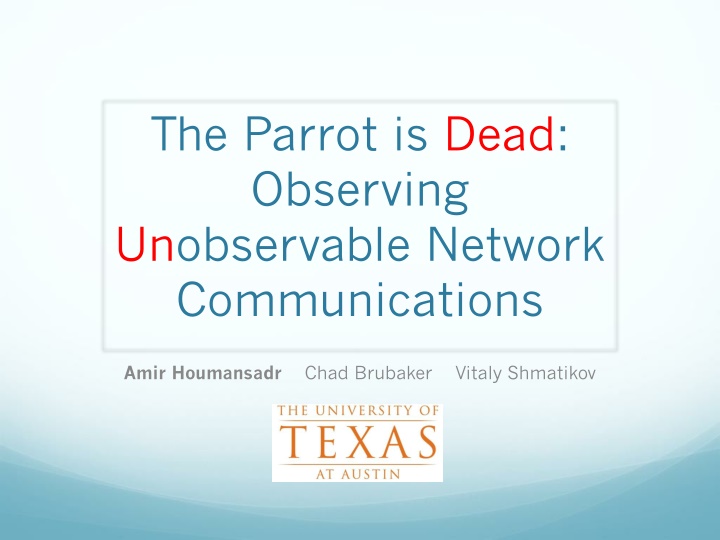
Observing Unobservable Network Communications in Censorship Circumvention
The study delves into the challenges posed by Internet censorship on repressive regimes and the need for unobservable circumvention systems. Various techniques like DPI, DNS hijacking, and deep packet inspection are explored, alongside proposed solutions like Parrot systems and SkypeMorph. The emphasis is on ensuring that censors cannot detect circumvention traffic or end-hosts using passive, active, or proactive surveillance methods.
Download Presentation

Please find below an Image/Link to download the presentation.
The content on the website is provided AS IS for your information and personal use only. It may not be sold, licensed, or shared on other websites without obtaining consent from the author. If you encounter any issues during the download, it is possible that the publisher has removed the file from their server.
You are allowed to download the files provided on this website for personal or commercial use, subject to the condition that they are used lawfully. All files are the property of their respective owners.
The content on the website is provided AS IS for your information and personal use only. It may not be sold, licensed, or shared on other websites without obtaining consent from the author.
E N D
Presentation Transcript
The Parrot is Dead: Observing Unobservable Network Communications Amir Houmansadr Chad Brubaker Vitaly Shmatikov
Internet Censorship The Internet is a big threat to repressive regimes! Repressive regimes censor the Internet: IP filtering, DNS hijacking, Deep packet-inspection, etc. Circumvention systems 2
The Internet Censorship Region Allowed Destination X Blocked Destination
The Internet Censorship Region DPI X Blocked Destination
We need unobservable circumvention Censors should not be able to identify circumvention traffic or end-hosts through passive, active, or proactive techniques
Lets hide! The Internet Censorship Region
Parrot systems Imitate a popular protocol SkypeMorph (CCS 12) StegoTorus (CCS 12) CensorSpoofer (CCS 12)
What's, uh... What's wrong with it? 'E's dead, that's what's wrong with it!
SkypeMorph The Internet Censorship Region Traffic Shaping SkypeMorph Client SkypeMorph Bridge A Tor node
SoM header The start of message (SoM) header field is MISSING! Single-packet identifier, instead of sophisticated statistical traffic analysis
SkypeMorph The Internet Censorship Region TCP control SkypeMorph Bridge SkypeMorph Client A Tor node
No, no.....No, 'e's stunned!
SkypeMorph+ Let s imitate the missing! Hard to mimic dynamic behavior Active/proactive tests
Other tests Test Skype SkypeMorph+ Flush Supernode cache Drop UDP packets Serves as a SN Rejects all Skype messages No reaction Burst of packets in TCP control Ends the UDP stream Close TCP channel No reaction Delay TCP packets Reacts depending on the type of message Initiates UDP probes No reaction Close TCP connection to a SN Block the default TCP port No reaction Connects to TCP ports 80 and 443 No reaction
Now that's what I call a dead parrot.
StegoTorus The Internet Censorship Region HTTP HTTP Skype StegoTorus Client StegoTorus Bridge A Tor node Ventrilo HTTP
StegoTorus chopper Dependencies between links
StegoTorus-Skype The same attacks as SkypeMorph Even more attacks!
StegoTorus-HTTP Does not look like a typical HTTP server! Most HTTP methods not supported!
CensorSpoofer The Internet Censorship Region SIP server Spoofer Censored destination RTP downstream RTP upstream CensorSpoofer Client Dummy host
SIP probing The Internet Censorship Region SIP server Spoofer Censored destination RTP downstream RTP upstream CensorSpoofer Client Dummy host
No no! 'E's pining! 'E's not pinin'! 'E's expired and gone to meet 'is maker!
Lesson 1 Unobservability by imitation is fundamentally flawed!
Imitation Requirements Correct SideProtocols IntraDepend InterDepend Err Network Content Patterns Users Geo Soft OS
Lesson 2 Partial imitation is worse than no imitation!
Alternative Do not imitate, but Run the target protocol IP over Voice-over-IP [NDSS 13] Challenge: efficiency






















